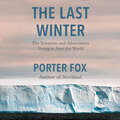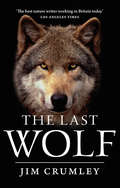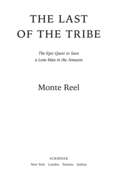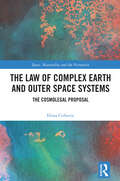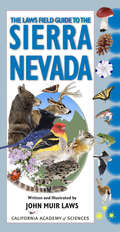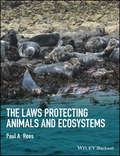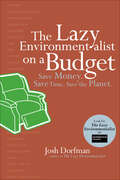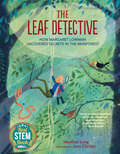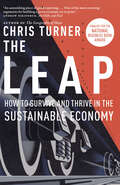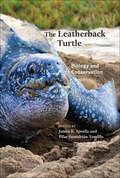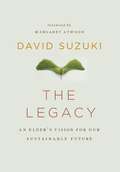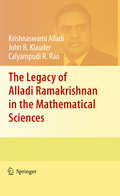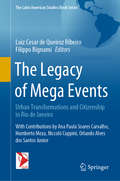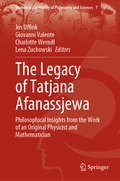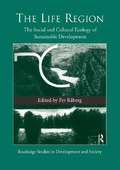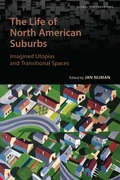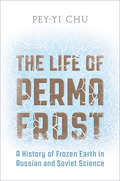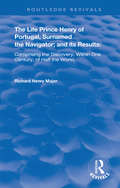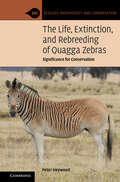- Table View
- List View
The Last Winter: The Scientists and Adventurers Trying to Save the World
by Porter FoxAs the planet warms due to greenhouse gas emissions, winter as we know it is disappearing. In the last fifty years, the Northern Hemisphere lost a million square miles of spring snowpack and in the US alone, snow cover has been reduced by 15-30%. On average, winter has shrunk by a month in most northern latitudes.In this deeply researched and adventure-filled book, journalist Porter Fox travels along the edge of the Northern Hemisphere's snow line to track the scope of this drastic change, and ultimately, predict what the future of winter-or lack thereof-will look like.This original research will be animated by five harrowing and illuminating journeys- each grounded by interviews with idiosyncratic, charismatic experts in their respective fields and Fox's own narrative of growing up on a remote island in Northern Maine.Timely, atmospheric, and expertly investigated, THE LAST WINTER will showcase like never before the true cost of climate change.(P) 2021 Headline Publishing Group Limited
The Last Winter: The Scientists, Adventurers, Journeymen, and Mavericks Trying to Save the World
by Porter FoxOne man&’s &“curiously thrilling joyride&” of travelogue, history, and climatology, across a planet on the brink of cataclysmic transformation (Donovan Hohn).As the planet warms, winter is shrinking. In the last fifty years, the Northern Hemisphere lost a million square miles of spring snowpack and in the US alone, snow cover has been reduced by 15-30%. On average, winter has shrunk by a month in most northern latitudes.In this deeply researched, beautifully written, and adventure-filled book, journalist Porter Fox travels along the edge of the Northern Hemisphere's snow line to track the scope of this drastic change, and how it will literally change everything—from rapid sea level rise, to fresh water scarcity for two billion people, to massive greenhouse gas emissions from thawing permafrost, and a half dozen climate tipping points that could very well spell the end of our world.This original research is animated by four harrowing and illuminating journeys—each grounded by interviews with idiosyncratic, charismatic experts in their respective fields and Fox's own narrative of growing up on a remote island in Northern Maine.Timely, atmospheric, and expertly investigated, The Last Winter will showcase a shocking and unexpected casualty of climate change—that may well set off its own unstoppable warming cycle.
The Last Wolf
by Jim CrumleyAn elegant and imaginative account that readdresses the place of the wolf in modern Scotland from &“the best nature writer working in Britain today&” (Los Angeles Times Book Review). In The Last Wolf, Jim Crumley explores the place of the wolf in Scotland—past, present and future—and challenges many of the myths that have been regarded for centuries as biological fact. Bringing to bear a lifetime&’s immersion in his native landscape and more than twenty years as a professional nature writer, Crumley questions much of the written evidence on the plight of the wolf in light of contemporary knowledge and considers the wolf in today&’s world, an examination that ranges from Highland Scotland to Devon and from Yellowstone in North America to Norway and Italy, as he pursues a more considered portrait of the animal than the history books have previously offered. Within the narrative, Crumley also examines the extraordinary phenomenon of wolf reintroductions physically transforming the landscapes in which they live; that even the very colors of the land change under the influence of teeming grasses, flowers, trees, butterflies, birds, and mammals that flourish in their company. Crumley makes the case for their reintroduction into Scotland with all the passion and poetic fervor that has become the hallmark of his writing over the years.&“Jim Crumley&’s task is to persuade the human beings of the Highlands that all of our lives would be richer in the presence of wolves. It is, as he acknowledges, a difficult task. If everybody in Scotland was to read The Last Wolf it would become immeasurably easier.&” —Roger Hutchinson, author of The Butcher, the Baker, the Candle-Stick Maker
The Last of the Tribe
by Monte ReelThroughout the centuries, the Amazon has yielded many of its secrets, but it still holds a few great mysteries. In 1996 experts got their first glimpse of one: a lone Indian, a tribe of one, hidden in the forests of southwestern Brazil. Previously uncontacted tribes are extremely rare, but a one-man tribe was unprecedented. And like all of the isolated tribes in the Amazonian frontier, he was in danger. Resentment of Indians can run high among settlers, and the consequences can be fatal. The discovery of the Indian prevented local ranchers from seizing his land, and led a small group of men who believed that he was the last of a murdered tribe to dedicate themselves to protecting him. These men worked for the government, overseeing indigenous interests in an odd job that was part Indiana Jones, part social worker, and were among the most experienced adventurers in the Amazon. They were a motley crew that included a rebel who spent more than a decade living with a tribe, a young man who left home to work in the forest at age fourteen, and an old-school sertanista with a collection of tall tales amassed over five decades of jungle exploration. Their quest would prove far more difficult than any of them could imagine. Over the course of a decade, the struggle to save the Indian and his land would pit them against businessmen, politicians, and even the Indian himself, a man resolved to keep the outside world at bay at any cost. It would take them into the furthest reaches of the forest and to the halls of Brazil's Congress, threatening their jobs and even their lives. Ensuring the future of the Indian and his land would lead straight to the heart of the conflict over the Amazon itself. A heart-pounding modern-day adventure set in one of the world's last truly wild places, The Last of the Tribe is a riveting, brilliantly told tale of encountering the unknown and the unfathomable, and the value of preserving it.
The Laurel's Kitchen Bread Book: A Guide to Whole-Grain Breadmaking
by Carol Lee Flinders Laurel Robertson Bronwen GodfreyFrom the simplest white bread, to the most complicated holiday bread, the recipes is probably in this book. Want to try your hand at making sourdough started? Looking for something to do with spelt? Are you longing for the tastes of Grandma's kitchen? This is a marvelous reference as well as a useful cookbook, and there is plenty for the armchair cook, too.
The Law of Complex Earth and Outer Space Systems: The Cosmolegal Proposal (Space, Materiality and the Normative)
by Elena CirkovicThis book offers a paradigm-shifting exploration of lawmaking for the complex interactions between Earth systems and outer space. Drawing on complex systems science, posthuman approaches, and plural ontologies, the author proposes a reimagining of law and governance for the cosmic age. Through the “cosmolegal” perspective, this study embraces the inherent uncertainties and complexities of Earth-space interactions. From Arctic methane craters to orbital debris, the book weaves together scientific insights, landscape architecture, legal theory, and doctrine to address pressing environmental challenges that span Earth and beyond.While legal scholarship has increasingly engaged with Earth System Science, it typically treats outer space as distinct from Earth’s environment. However, Earth’s existence and complex systems are fundamentally intertwined with and emerge from outer space. This book argues that a legal framework for Earth’s systems needs to include outer space.At its core, the book advocates for a “complexification” of law, calling for greater epistemic humility in legal thought and practice. Thoughtful and provocative, this work invites readers to reconsider fundamental assumptions about law, nature, and agency beyond the human in an era of planetary change. The cosmolegal approach aims to shift legal imagination and understanding, positioning human law as just one of many actors within the cosmos.This original work will appeal to scholars of legal theory and environmental law, as well as those interested in posthumanism, ecology, and materialism.
The Laws Field Guide to the Sierra Nevada
by John Muir LawsIn this groundbreaking and meticulously field-tested guide, the rich variety of Sierra life—trees, wildflowers, ferns, fungi, lichens, fish, reptiles, amphibians, birds, mammals, and insects—comes alive.Easy-to-use features include:Intuitive organization, color tabs, and simple keys;Similar-looking species side by side;Over 2,800 full-color illustrations;Range maps of species that are otherwise difficult to distinguish;Index of common and scientific names;Lightweight and compact—ideal for backpacking.Impressively detailed and comprehensive, the guide includes:More than 1,700 species;Descriptions of behavior, adaptations, and interactions between species;Species and topics not found in most guides, including aquatic life, spiders and webs, plankton, plant galls, bark beetle galleries, animal tracks and evidence, seasonal star charts, weather patterns, and cloud formations.
The Laws Protecting Animals and Ecosystems
by Paul A. ReesThere is currently no basic text in wildlife law suitable for the wide range of courses in wildlife conservation and animal welfare at both bachelors and masters level, or for the large number of people who work in conservation and animal welfare; The Laws Protecting Animals and Ecosystems fills the gap in this significant market for a basic law text applicable to students and professionals whose primary training is in biology but who require a basic understanding of the laws relating to the protection of animals and ecosystems. The text is applicable to a wide range of subjects, including wildlife conservation, animal handling, animal welfare, animal husbandry, and veterinary science. This foundational text supports those studying animal and ecosystem law by providing an overview of the basic legal principles, national and international laws, terminology, the legal mechanisms used to protect animals and ecosystems, and a compendium of the major animal welfare and conservation laws in major English speaking countries. Dr. Rees has been teaching wildlife law for 20 years and ecology for over 35 years and is ideally placed to write this book.
The Lazy Environmentalist on a Budget: Save Money. Save Time. Save the Planet.
by Josh Dorfman&“A must-read for anyone who wants to live well and still reduce their impact on the planet.&” (David de Rothschild, author of The Global Warming Survival Handbook and host of Sundance Channel&’s Eco-Trip: The Real Cost of Living) In The Lazy Environmentalist on a Budget, Josh Dorfman takes you inside the latest developments in green living to demonstrate how you can easily and affordably have your designer jeans and your planet too. From raising eco-conscious kids to greening your daily commute, Dorfman provides insights into the next wave of green innovation and the products and services that will lighten your planetary impact and lower your expenses. Find bargain basement deals on stylish organic bedding and bamboo furnishings at the largest retailers in the world. Score instant rebates on everything from compact fluorescent light bulbs to energy-efficient air conditioners. And earn reward points for carpooling with friends. In a time when many people are feeling financially restricted, The Lazy Environmentalist on a Budget is your guide to effortlessly saving the planet while keeping some extra cash in your pocket. &“Fun, easy, and inexpensive. Josh Dorfman shows that going green can help you look and feel fantastic, and this time it makes perfect dollars and cents.&” —Summer Rayne Oakes, model-activist and author of Style Naturally: The Savvy Shopping Guide to Sustainable Fashion and Beauty
The Leaf Detective: How Margaret Lowman Uncovered Secrets in the Rainforest
by Heather Lang2022 Green Earth Book Award WinnerNCSS Septma Clark Award, Elementary Level HonoreeNSTA/CBC Best STEM BookJunior Library Guild SelectionJohn Burroughs Association Riverby Award Honorable Mention, Sigurd F. Olson Nature Writing AwardThis picture book biography tells the story of Meg Lowman, a groundbreaking female scientist called a "real life Lorax" by National Geographic, who was determined to investigate the marvelous, undiscovered world of the rainforest treetops. Meg Lowman was always fascinated by the natural world above her head — the colors, the branches, and, most of all, the leaves and mysterious organisms living there. Meg set out to climb up and investigate the rain forest tree canopies — and to be the first scientist to do so. But she encountered challenge after challenge. Male teachers would not let her into their classrooms, the high canopy was difficult to get to, and worst of all, people were logging and clearing the forests. Meg never gave up or gave in. She studied, invented, and persevered, not only creating a future for herself as a scientist, but making sure that the rainforests had a future as well. Working closely with Meg Lowman, author Heather Lang and artist Jana Christy beautifully capture Meg's world in the treetops."Meg Lowman or 'Canopy Meg' is a true hero, a courageous explorer, who made amazing discoveries high in the forest canopy. The Leaf Detective captures the magic of that little-known world with its clear, informative text and fabulous illustrations. Young readers everywhere will be fascinated and inspired to learn more about nature." —Jane Goodall, PhD, DBE, Founder of the Jane Goodall Institute and Pioneer of Peace&“Margaret Lowman is a pioneer scientist in a discipline that demands exceptional imagination, courage, and physical rigor. But of equal importance, she has created an extraordinarily important branch of environmental and conservation research. Heather Lang and Jana Christy, in this charming introduction, have invited us to climb on up and visit her.&” —Edward O. Wilson, Pulitzer Prize winner and Professor Emeritus, Harvard University
The Leap
by Chris TurnerThe revolutionary follow-up to Chris Turner's Governor General's Literary Award and National Business Book Award nominee, The Geography of Hope.The most vital project of the twenty-first century is a shift from our unsustainable way of life to a sustainable one--a great lateral leap from a track headed for economic and ecological disaster to one bound for renewed prosperity. In The Leap, Chris Turner presents a field guide to making that jump, drawing on recent breakthroughs in state-of-the-art renewable energy, cleantech and urban design. From the solar towers of sunny Spain to the bike paths and pedestrianized avenues of the world's most livable city--Copenhagen, Denmark--to the nascent "green-collar" economies rejuvenating the former East Germany and the American Rust Belt, he paints a vivid portrait of a new, sustainable world order already up and running.In his 2007 book, The Geography of Hope, Chris Turner wrote about an emerging world of cleantech possibility. This led to a two-year stint as sustainability columnist for the Globe and Mail, during which many of the fringe developments covered in his book became vital. By the time those two years were up his reporting tracks were being retraced by mainstream outlets like the New York Times. In The Leap, he once again charts the world's near-future course.From the Hardcover edition.
The Leatherback Turtle: Biology and Conservation
by James R. Spotila Pilar Santidrián TomilloThe most comprehensive book ever written on leatherback sea turtles.Weighing as much as 2,000 pounds and reaching lengths of over seven feet, leatherback turtles are the world’s largest reptile. These unusual sea turtles have a thick, pliable shell that helps them to withstand great depths—they can swim more than one thousand meters below the surface in search of food. And what food source sustains these goliaths? Their diet consists almost exclusively of jellyfish, a meal they crisscross the oceans to find. Leatherbacks have been declining in recent decades, and some predict they will be gone by the end of this century. Why? Because of two primary factors: human redevelopment of nesting beaches and commercial fishing. There are only twenty-nine index beaches in the world where these turtles nest, and there is immense pressure to develop most of them into homes or resorts. At the same time, longline and gill net fisheries continue to overwhelm waters frequented by leatherbacks. In The Leatherback Turtle, James R. Spotila and Pilar Santidrián Tomillo bring together the world’s leading experts to produce a volume that reveals the biology of the leatherback while putting a spotlight on the conservation problems and solutions related to the species. The book leaves us with options: embark on the conservation strategy laid out within its pages and save one of nature’s most splendid creations, or watch yet another magnificent species disappear.
The Legacy
by Margaret Atwood David SuzukiIn this expanded version of an inspiring speech delivered in December 2009, David Suzuki reflects on how we got where we are today and presents his vision for a better future. In his living memory, Suzuki has witnessed cataclysmic changes in society and our relationship with the planet: the doubling of the world's population, our increased ecological footprint, and massive technological growth.Today we are in a state of crisis, and we must join together to respond to that crisis. If we do so, Suzuki envisions a future in which we understand that we are the Earth and live accordingly. All it takes is imagination and a determination to live within our, and the planet's, means. This book is the culmination of David Suzuki's amazing life and all of his knowledge, experience, and passion - it is his legacy.
The Legacy of Alladi Ramakrishnan in the Mathematical Sciences
by Krishnaswami Alladi John R. Klauder Calyampudi R. RaoIn the spirit of Alladi Ramakrishnan's profound interest and contributions to three fields of science -- Mathematics, Statistics, and Physics -- this volume contains invited surveys and research articles from prominent members of these communities who also knew Ramakrishnan personally and greatly respected his influence in these areas of science. Historical photos, telegrams, and biographical narratives of Alladi Ramakrishnan's illustrious career of special interest are included as well.
The Legacy of Mega Events: Urban Transformations and Citizenship in Rio de Janeiro (The Latin American Studies Book Series)
by Ana Paula Carvalho Humberto Meza Niccoló Cuppini Orlando Alves dos Santos JuniorThis edited volume offers a critical reflection on the failed experiment to redevelop the city of Rio de Janeiro according to the neoliberal strategy of entrepreneurial urban governance and mercantile regulatory transformations, which were leveraged by mega-sporting events. The case of Rio de Janeiro is presented as an example of a failing global strategy for urban redevelopment, entrepreneurial urban governance and the realization of mega-events. This book aims to present the real and critical state of the legacies of such mega-events. It shows how instead of the promised economic redemption, Rio is experiencing a severe economic, political and social crisis, handling three observation perspectives: the first is the description of urban transformations and mega events, assessing the contradictions in the model for the intended urban development and taking into account historical factors both at local and national level; the second restricts on neighborhoods as case studies representing an ensign of a neoliberal urban transformation’ results; the third links city and citizenship focusing tensions and inconsistencies and opening up a perspective on the importance of fostering the concept of citizenship, including actions, movements and initiatives that express the resistance and struggles around a possible new destination for Rio de Janeiro.Prof. Luiz Cesar de Quieroz Ribeiro and Dr. Filippo Bignami as General Editors thank Ana Paula Soares Carvalho, Humberto Meza, Niccoló Cuppini and Orlando dos Santos Junior for their contributions as co-editors of this book.
The Legacy of Tatjana Afanassjewa: Philosophical Insights from the Work of an Original Physicist and Mathematician (Women in the History of Philosophy and Sciences #7)
by Jos Uffink Giovanni Valente Charlotte Werndl Lena ZuchowskiThis book presents a collection of essays that explore the life and works of Tatjana Afanassjewa (1876–1964), a Russian–Dutch physicist–mathematician. Readers will discover a scientist whose work on the foundations of thermodynamics significantly influenced the field itself as well as the philosophy of physics. This book highlights the philosophical consequences of her work in physics and mathematics and discusses historical aspects of her writings on the foundations of physics. In addition, it features English translations and critical reviews of key selections from her texts.First and foremost, the book highlights the numerous contributions that Afanassjewa made to the field. In particular, the authors examine her work on the foundations of thermodynamics and statistical physics, starting in the 1920s and extending to 1956, well after the untimely death of her husband in 1933. They also explore her almost entirely forgotten work on the didactics of mathematics. In addition, they discuss her influential collaboration with her husband, the Austrian physicist Paul Ehrenfest (1880–1933).The portrait that emerges is that of a highly original physicist and mathematician, whose legacy continues to influence scientists and philosophers today and whose lesser-known works deserve more attention than they have received. Readers will find a rich body of work that continues to this day to yield insights into the foundations of physics and mathematics.
The Letters and Journals of Simon Fraser, 1806-1808
by W. Kaye Lamb Michael GnarowskiB.C. journalist Stephen Hume has said that fur trader and explorer Simon Fraser should be celebrated as the founder of British Columbia. Certainly, the achievements of the Scottish-descended United Empire Loyalist adventurer were impressive. During three extraordinary years, 1805-1808, Fraser undertook the third major expedition (after Alexander Mackenzie’s and Lewis and Clark’s) across North America, culminating in his famous journey down the river in British Columbia that now bears his name. Employed by the Montreal-based North West Company, Fraser was responsible for building many of British Columbia’s first trading posts. His exploratory efforts helped lead to Canada’s boundary later being declared at the 49th parallel. In this new volume, librarian and archivist W. Kaye Lamb provides a detailed introduction as well as illuminating annotations to Fraser’s journals, which were originally published by Macmillan of Canada in 1960.
The Librarian Who Measured the Earth
by Kathryn LaskyA biography of the Greek philosopher and scientist Eratosthenes, who compiled the first geography book and accurately measured the globe's circumference.
The Life Cycle (Cycles of Nature)
by Jaclyn JaycoxFrom butterflies to sunflowers, each living thing follows a life cycle. Uncover the facts of both animal and plant life cycles, and learn how people's actions can impact them.
The Life Region: The Social and Cultural Ecology of Sustainable Development (Routledge Studies in Development and Society #10)
by Per RåbergThis book launches a strategy for sustainable development, starting from a socio-ecological position and developing a model for a socially and culturally supportive community, or 'Life Region'. Special emphasis is placed on the situation of the provincial and peripheral regions of Europe and the world, and the introduction of self-reliant civic strategies in national and international politics.
The Life of José María Sobral
by Mary R. TahanFeaturing the previously unpublished diary of José María Sobral, Under-Lieutenant of the Argentine Navy, this book provides insight on his life and his participation in Otto Nordenskjöld's Swedish Antarctic Expedition of 1901-1903.This biography highlights Sobral's personal thoughts on the mission, his position, the science being discovered, and the geopolitical situation around him. The reader also learns about the state of science, Antarctic exploration, and cultural-political-issues at that time. The author's critical and contextual analysis of the diary explains more about Sobral and his role in Argentina, Antarctica, science and history. This paints a detailed picture of Sobral as an individual, and provides the framework to depict the world in which Sobral lived and worked as well as his expedition and accomplishments. The book aims to explain the context of Sobral's writings, the significance of the events he described in his diary entries, and the way all of these events tied into history and scientific discovery.
The Life of North American Suburbs (Global Suburbanisms)
This book chronicles and explains the role of suburbs in North American cities since the mid-twentieth century. Examining fifteen case studies from New York to Vancouver, Atlanta to Chicago, Montreal to Phoenix, The Life of North American Suburbs traces the insightful connection between the evolution of suburbs and the cultural dynamics of modern society. Suburbs are uniquely significant spaces: their creation and evolution reflect the shifting demographics, race relations, modes of production, cultural fabric, and class structures of society at large. The case studies investigate the place of suburbs within their wider metropolitan constellations: the crucial role they play in the cultural, economic, political, and spatial organization of the city. Together, the chapters paint a compelling portrait of North American cities and their dynamic suburban landscapes.
The Life of Permafrost: A History of Frozen Earth in Russian and Soviet Science
by Pey-Yi ChuIn the Anthropocene, the thawing of frozen earth due to global warming has drawn worldwide attention to permafrost. Contemporary scientists define permafrost as ground that maintains a negative temperature for at least two years. But where did this particular conception of permafrost originate, and what alternatives existed? The Life of Permafrost provides an intellectual history of permafrost, placing the phenomenon squarely in the political, social, and material context of Russian and Soviet science. Pey-Yi Chu shows that understandings of frozen earth were shaped by two key experiences in the Russian Empire and the Soviet Union. On one hand, the colonization and industrialization of Siberia nourished an engineering perspective on frozen earth that viewed the phenomenon as an aggregate physical structure: ground. On the other, a Russian and Soviet tradition of systems thinking encouraged approaching frozen earth as a process, condition, and space tied to planetary exchanges of energy and matter. Aided by the US militarization of the Arctic during the Cold War, the engineering view of frozen earth as an obstacle to construction became dominant. The Life of Permafrost tells the fascinating story of how permafrost came to acquire life as Russian and Soviet scientists studied, named, and defined it.
The Life of Prince Henry of Portugal: Surnamed the Nabigator and its Results (Routledge Revivals)
by Richard Henry MajorOriginally published in 1868, this book follows the life of Prince Henry, including chapters on the Siege of Tangier, the capture of Ceuta and the death of Prince Henry.
The Life, Extinction, and Rebreeding of Quagga Zebras: Significance for Conservation (Ecology, Biodiversity and Conservation)
by Peter HeywoodQuaggas were beautiful pony-sized zebras in southern Africa that had fewer stripes on their bodies and legs, and a browner body coloration than other zebras. Indigenous people hunted quaggas, portrayed them in rock art, and told stories about them. Settlers used quaggas to pull wagons and to protect livestock against predators. Taken to Europe, they were admired, exhibited, harnessed to carriages, illustrated by famous artists and written about by scientists. Excessive hunting led to quaggas' extinction in the 1880s but DNA from museum specimens showed rebreeding was feasible and now zebras resembling quaggas live in their former habitats. This rebreeding is compared with other de-extinction and rewilding ventures and its appropriateness discussed against the backdrop of conservation challenges—including those facing other zebras. In an Anthropocene of species extinction, climate change and habitat loss which organisms and habitats should be saved, and should attempts be made to restore extinct species?
